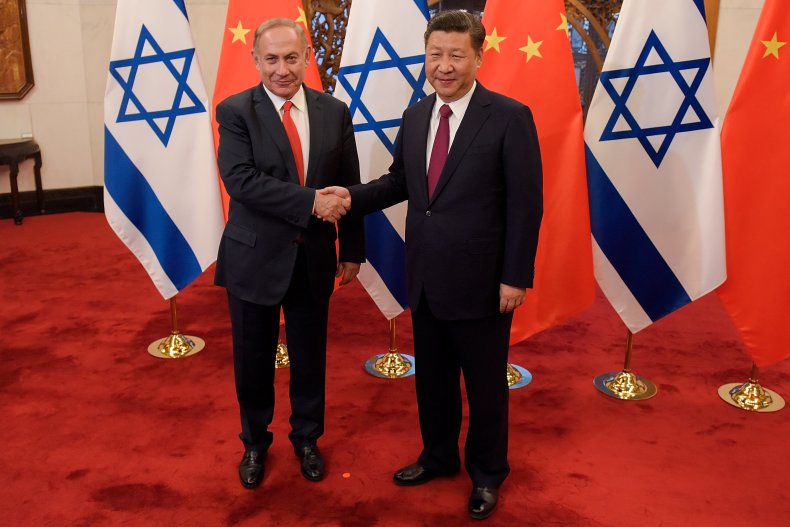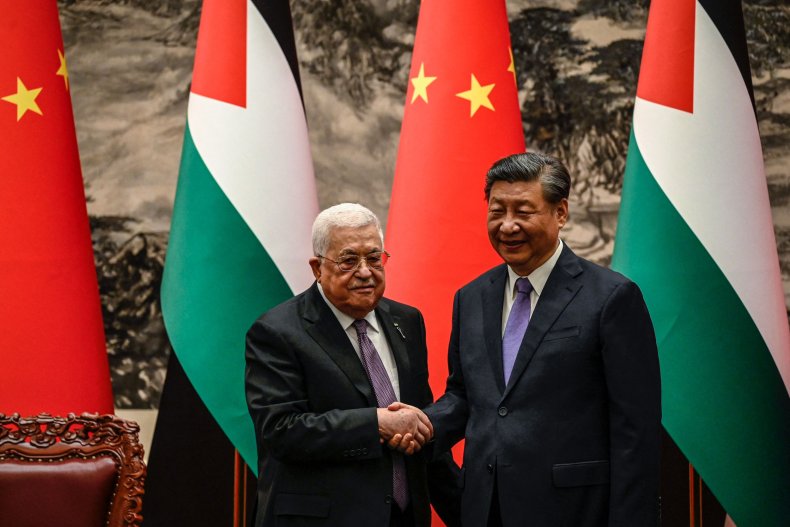Beijing is willing to play a role in easing flaring Israeli-Palestinian tensions at a time when Israeli Prime Minister Benjamin Netanyahu said he plans to visit the People's Republic, a Chinese official told Newsweek.
With clashes still raging Monday over an ongoing large-scale Israel Defense Forces (IDF) operation against suspected armed Palestinian factions in the West Bank city of Jenin, Chinese Embassy to the United States spokesperson Liu Pengyu told Newsweek that "China is deeply concerned about the escalation of conflict between Israel and Palestine and the deaths and injuries of innocent civilians.
"China is opposed to unilateral actions that exacerbate tensions in the occupied territory, all violence against civilians, as well as irresponsible provocation and incitement," he added.
Liu then outlined the Chinese position on the decades-long conflict, one in which Beijing was prepared to play a constructive role amid growing Chinese influence in the broader region.
"The fundamental solution to the Palestinian-Israeli conflict and the Palestinian question lies in the resumption of peace talks and the implementation of the two-State solution," Liu stated.
"China stands ready to work with the international community to actively contribute to the realization of the peaceful coexistence of Palestine and Israel, the common development of the Arab and Jewish peoples, and the lasting peace and stability of the Middle East at an early date," he added.

China's relationship with the Israeli-Palestinian conflict has been complex.
Just two years after Israel's 1948 establishment in the midst of war with neighboring Arabs who supported the overlapping territorial claims of Palestinians, Israel became the first country in the Middle East to recognize Communist rule in China. The People's Republic would go on, however, to support Palestinian resistance movements until adopting a more diplomatic approach in the 1980s and finally establishing formal ties with Israel in 1992.
Over the past decade of President Xi Jinping's leadership, China has accelerated its ties across the Middle East, especially in the economic and trade sectors. In fact, the Palestinian National Authority's signing of a memorandum of understanding to participate in Xi's Belt and Road Initiative in December has left Israel as the only government in the region not part of the intercontinental span of infrastructure and investment projects.
Meanwhile, Xi has also continued to invest more heavily in Middle East diplomacy.
Xi promoted an initial four-point peace plan to address the Israeli-Palestinian feud shortly after assuming power in 2013 and then offered a revised version in 2017, following separate meetings with Netanyahu and Palestinian National Authority President Mahmoud Abbas.
The framework called for a two-state solution including a Palestinian country based on pre-1967 war borders with East Jerusalem as its capital, stopping Israeli settlements and restarting peace talks, coordinating international efforts for promoting peace as well as promoting peace through Israeli-Palestinian development and cooperation.
While little progress has been made on these fronts over the past six years, the United States, which has served as the traditional mediator in the Israeli-Palestinian conflict, has also failed to advance the peace process.
President Donald Trump's so-called "plan of the century" only won Netanyahu's backing and was immediately rejected by Palestinian leadership. President Joe Biden's administration has avoided wading too deeply into the conflict as it focused on other issues concerning Washington's interests in the region, such as Iran, which has also sought closer ties with top U.S. geopolitical rival China.
The Biden administration has also sought to capitalize on the Trump-era Abraham Accords through which the United Arab Emirates, Bahrain, Sudan and Morocco established ties with Israel, by attempting to secure a normalization of Israeli-Saudi ties. But in March of this year, China managed to broker a different deal through which rivals Iran and Saudi Arabia resumed ties after a six-year hiatus, demonstrating Beijing's clout in the region.
The following month, Xi hosted Abbas for a three-day visit in Beijing during which the two sides signed a "strategic partnership" deal. And, last week, Netanyahu told a bipartisan delegation of U.S. lawmakers that he had been invited to China.
At a time when the U.S.-China competition continue to play out across the globe, with the Middle East being a particular venue of contention, Netanyahu was said by his office to have "stressed to the members of Congress that the security and intelligence cooperation between the U.S. and Israel is at an all-time peak, and emphasized that the U.S. will always be Israel's most vital ally and irreplaceable ally."
The Israeli premier reportedly reiterated this message Monday while speaking at an Independence Day event held at the U.S. Embassy in Jerusalem.

China has yet to confirm the trip. Asked about the possible visit, Chinese Foreign Ministry spokesperson Mao Ning simply told reporters last week that "China and Israel maintain friendly exchanges" and that "China stands ready to work with Israel for sustained and steady growth of our innovative comprehensive partnership," a term considered unique among Beijing's vast network of global partnerships.
Newsweek has reached out to the Israeli Foreign Ministry for comment.
Meanwhile, U.S. officials have warned their Israeli counterparts regarding possible national security implications of partnering with China in sensitive fields viewed as crucial to the U.S.-Israel alliance.
But speaking to reporters during a press briefing last Wednesday, U.S. State Department deputy spokesperson Vedant Patel said that "countries can have a relationship with the PRC just as we do and we expect the Netanyahu government and the prime minister to raise issues of their interest and of mutual concern on a potential visit to Beijing."
Patel downplayed the significance of Netanyahu's potential visit to the state of U.S.-Israel relations.
"I think it's important to not get caught up in things like sequencing and choreographics like that, and it's more important to stay focus on the substance of the issues," Patel said, "and the substance of the issues are that we are in direct contact and engagement directly with our Israeli partners, and we have a number of issues at the nexus of our relationship that we look forward to continuing to engage on bilaterally."
He affirmed that the U.S. "is going to continue to remain deeply engaged" in the Middle East, "both as it relates to continuing to pursue and advocate and push for and work with the parties directly as it relates to a negotiated two-state solution, but also when it comes to regional integration and normalization as well."
This article has been updated to include reference to the Palestinian National Authority's signing last December of a memorandum of understanding with China to participate in the Belt and Road Initiative.








